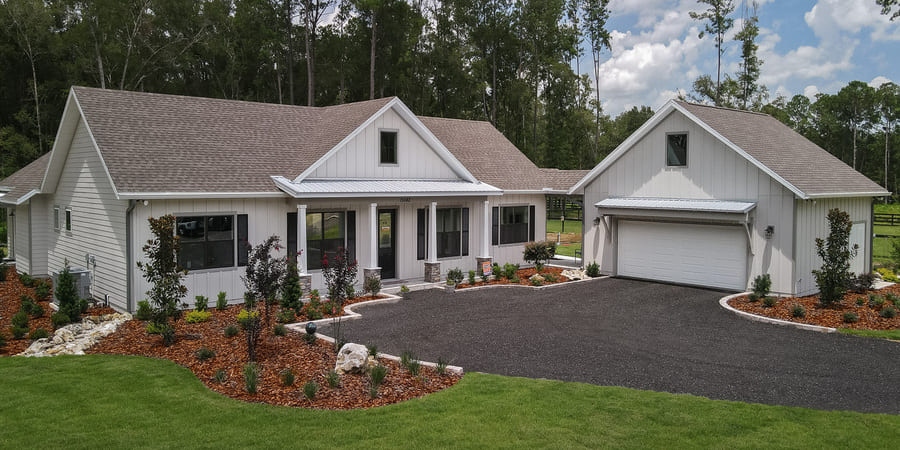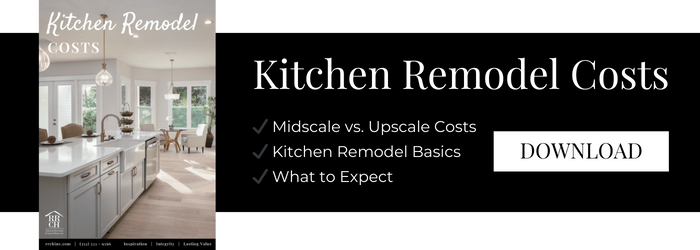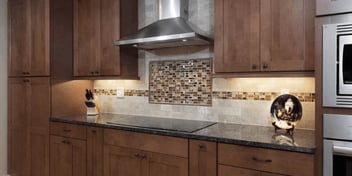5 Min Read
Financing a Custom Home in Gainesville, FL: Pitfalls to Avoid
You’ve looked at homes on the Florida market and there simply isn’t one that feels like a good fit, so you’ve decided to build your own custom home. Researching how to finance your custom home and the mistakes to avoid when building a new house is a lot like taking a class. There is a lot of information out there, so we’ve made it simple by compiling the most common pitfalls and how to avoid them. Whether you’re building a new home or planning to remodel your existing home, keep these tips in mind.

1. Not Learning What Your Loan Type
Options Are
The type of loan you’ll need to build a house is different from the loan you would use to buy a house that already exists, and not all lenders offer them. The traditional loan you would use is called a construction loan. The construction loan is used to buy land and pay any expenses in your construction bid that are related to construction, such as your contractor and subcontractors, construction allowances, materials, permitting, and closing costs.
There are two types of construction loans. The first is the construction-to-permanent loan and the other is the construction-only loan. The construction-to-permanent loan is also called the one-time close loan because you won’t have to reapply once the construction is complete. The construction-to-permanent loan will automatically transition into a permanent mortgage.
The construction-only loan, however, will only cover the building phase. Once your home is built, you will have up to one year to apply for a regular mortgage. This can be good if you weren’t happy with the original terms, but it does create more work for you.
To qualify for either, you’ll need a down payment of 20%, a decent credit score, and that particular lender’s minimum debt-to-income ratio. When you’re comparing interest rates, keep in mind that construction-only loans are slightly higher than construction-to-permanent loans.
2. Making Changes To Your Credit Before Closing
Opening a new line of credit, closing an old one, or putting a large purchase on credit are all red flags to a lender and can disqualify you from getting financing for your home. This is because these actions will affect your credit score so be sure to ask your lender before making any major changes to your credit. They may suggest a change if they believe it will help your approval, which is the only situation where making any change is okay.
Closing a line of credit is especially damaging. This lowers the amount of credit you have and will likely change your debt to income ratio and your credit utilization, which will impact your credit score.
Putting a large purchase on credit or missing a payment will make you look like an inconsistent and risky borrower to a lender. Be sure that all of your payments are on auto-draft so missing a payment is less likely. Also, put off large purchases until after closing. In the case of an emergency, like a major car repair, for example, talk to your lender about your options before spending, even if it’s out of your emergency cash reserves.
Finally, what one lender considers large, another lender might consider permissible. This means that you can’t count on what you’ve heard about the lending experience from friends and family. Your personal lender is the opinion that matters most.
3. Making Large Deposits or Withdrawals
Just as you shouldn’t make any major changes to your credit, avoid making any major changes to your account balances. Consistency is key. Regular fluctuations that are consistent month to month, like a car or student loan payments, are acceptable and expected.
A red flag can go up for your lender, however, if you have anything greater than $500 being deposited or withdrawn from your account. An unexpected deposit, even if it raises your cash reserves, still gives the appearance of inconsistent finances. As with anything else, check with your lender before making a large deposit or withdrawal so you aren’t disqualified from receiving home financing.
4. Not Shopping Different Lenders
This may seem like a no-brainer, but too many future homeowners don’t properly compare lenders after receiving their construction bid to find their best option. This doesn’t mean just perusing websites but really looking at each lender’s details side by side. After all, you’ve done what you can to control your project costs during the design phase, and keep the money-saving momentum going. Rates, fees, closing costs, and discount points will vary from lender to lender and you’ll want all of the information before choosing the one that’s right for your financial situation.
Being able to properly compare lenders means getting pre-approval from a few different lenders, even just two or three, but up to five is best. You will better be able to see a breakdown of how the rates and fees are defined. Once a lender receives your application, they have three days to give you a Loan Estimate. Fees, rates, taxes, insurance, and other costs will be included in this form. This will have every piece of information you need to make an informed decision on which lender to choose.
Keep in mind that once a lender pulls your credit, you will have a 45-day window to apply with other lenders for all of your applications to count as only one credit inquiry.
5. Keep An Eye On Your Credit Score
We all know how important a healthy credit score is for getting a loan and opening new lines of credit. Rather than checking your credit score just before applying for a loan, think of your credit score as an ongoing project that you need to work on first. Your score will fluctuate with paying down debt, increasing your credit limits, closing lines of credit, making hard inquiries, and other actions.
Check your score, how your score was determined, and where you lie with your debt. Then, create a roadmap for how to improve your score over the coming months. Online tools, like Credit Karma, are great for seeing where your credit stands, why, and how to improve. A higher score will positively impact your interest rate, your down payment, insurance, and the monthly payment, all because you’re seen as a dependable borrower.
In the end, a better score will make for a more affordable home and frequent check-ins are how to make sure you’re meeting your credit goals. Checking in often is also a way to make sure your credit report doesn’t contain errors. Disputing an error can take months, so catching it as early as possible will prevent delays in applying to potential lenders.
6. Overly Focusing On Interest Rates
The interest rate is only one part of the loan puzzle. As we’ve already discussed, you should also take into consideration fees, insurance, your monthly payment, and closing costs. Just focusing on the interest rate could result in overlooking other costs that would essentially negate a competitive rate.
Higher-than-usual interest rates can be mitigated with a few tricks. One is saving for a larger down payment. Higher interest rates are usually followed by lower home prices. However, if you are building a custom home and applying for a construction loan, a larger down payment is your best bet.
Don’t try to wait out the market. Instead, apply for construction-only loans. This way, you will have the opportunity to seek out a mortgage loan with a lower interest rate once your custom Florida home is completed.
Finally, although interest rates are rising, you can still build your custom dream home and focus instead on the monthly payment, which is affected by many more factors than the interest rates. Build up your credit score, save for a large down payment, and pay down debts. These are the keys to making your custom home goals a reality.
Working With a Custom Home Builder Who Gets It
Not every custom home builder or contractor is equipped to help you through the financing phase of your custom home project, which can make the entire process feel disjointed. Work with a custom home builder who can guide you through this complex process. Your contractor should be able to work with your lender to make the process as smooth as possible.
Robinson Renovation & Custom Homes has a wealth of experience working with lenders to make sure your dream custom Florida home is in good hands. Contact Robinson Renovation & Custom Homes to discuss the custom home building and financing process today.




